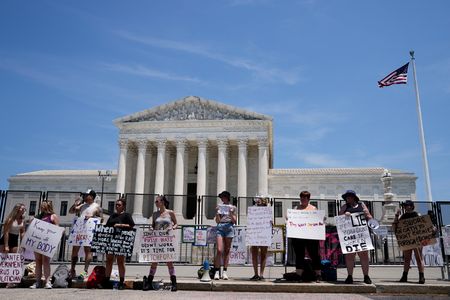By Steve Gorman
(Reuters) -A federal judge on Wednesday reinstated a decades-old North Carolina ban on abortions performed after 20 weeks of gestation, citing the U.S. Supreme Court’s recent decision allowing states to freely regulate procedures to terminate pregnancy.
Although so-called late-term procedures are rare, abortion rights proponents said Wednesday’s ruling chips away at reproductive healthcare access in one of the last Southern states where abortion has remained relatively unencumbered.
U.S. District Judge William Osteen in Greensboro lifted an injunction he had imposed in May 2019 barring enforcement of the 20-week cutoff as a violation of the Supreme Court’s 1973 landmark Roe v. Wade opinion that broadly legalized abortion nationally.
Under Roe, the high court established women’s constitutional right to terminate a pregnancy and ruled that states could only restrict abortions once the fetus was potentially viable outside the womb – generally starting at 24 to 28 weeks of gestation – unless a mother’s health was at risk.
Roe’s precedent was overturned on June 24 by the Supreme Court’s new conservative majority in a Mississippi case titled Dobbs v. Jackson, immediately clearing the way for all states to regulate abortion as they see fit, regardless of fetal viability.
The North Carolina statute restored by Osteen outlaws abortions after 20 weeks of pregnancy, except for medical emergencies that endanger the mother’s life.
A full-term pregnancy typically runs to about 40 weeks, and abortions after 20 weeks accounted for fewer than 1% of all abortions nationwide in 2019, according to data published by the U.S. Centers for Disease Control and Prevention.
Women seeking such abortions are typically those who had wanted to carry their pregnancies to term but faced an unexpected late-stage medical complication for themselves or their fetuses, said Molly River, a spokesperson for the group Planned Parenthood Votes! South Atlantic.
In most cases, such a diagnosis would not be covered under North Carolina’s narrow exemption to its 20-week abortion limit, Rivera said.
Following the Dobbs ruling, Osteen had invited all parties involved in litigation challenging the 20-week abortion limit, first enacted in 1973, to file court briefs arguing whether or not his injunction should remain in force.
Ultimately siding with North Carolina’s Republican legislative leaders, Osteen wrote in a 14-page decision that Dobbs removed any “constitutional right to a pre-viability abortion,” thus erasing any legal basis for his injunction.
He also dismissed arguments from local district attorneys who said dissolving the injunction would have no practical effect because they had no intention of enforcing the 20-week cutoff.
North Carolina, whose governor and attorney general are both Democrats who support abortion access, has remained one of the South’s few remaining redoubts for largely unrestricted reproductive health services after the Dobbs decision.
Several neighboring states have since outlawed abortions after six weeks, when many pregnant women have often yet to even realize they are expecting. As a result, the number of out-of-state abortion patients treated at North Carolina’s Planned Parenthood clinics alone has more than tripled since June, Rivera said.
Wednesday’s ruling is likely to further amplify abortion as a campaign issue heading into November elections in which North Carolina Republicans are aiming to pick up three seats in the General Assembly and two in the state Senate to regain super-majorities that can override vetoes of Governor Roy Cooper, a Democrat.
“Reproductive rights are absolutely on the ballot,” Rivera said.
Cooper on July 6 signed an executive order protecting abortion access in his state and declaring it a safe haven for women seeking reproductive services from other states, despite existing restrictions such as a mandatory 72-hour waiting period.
In a related development on Wednesday, the highest state court in South Carolina blocked enforcement of its six-week abortion cutoff while the court weighs a challenge to that law by a Planned Parenthood affiliate and other abortion providers.
(Reporting by Steve Gorman in Los Angeles; Editing by Leslie Adler and Stephen Coates)





